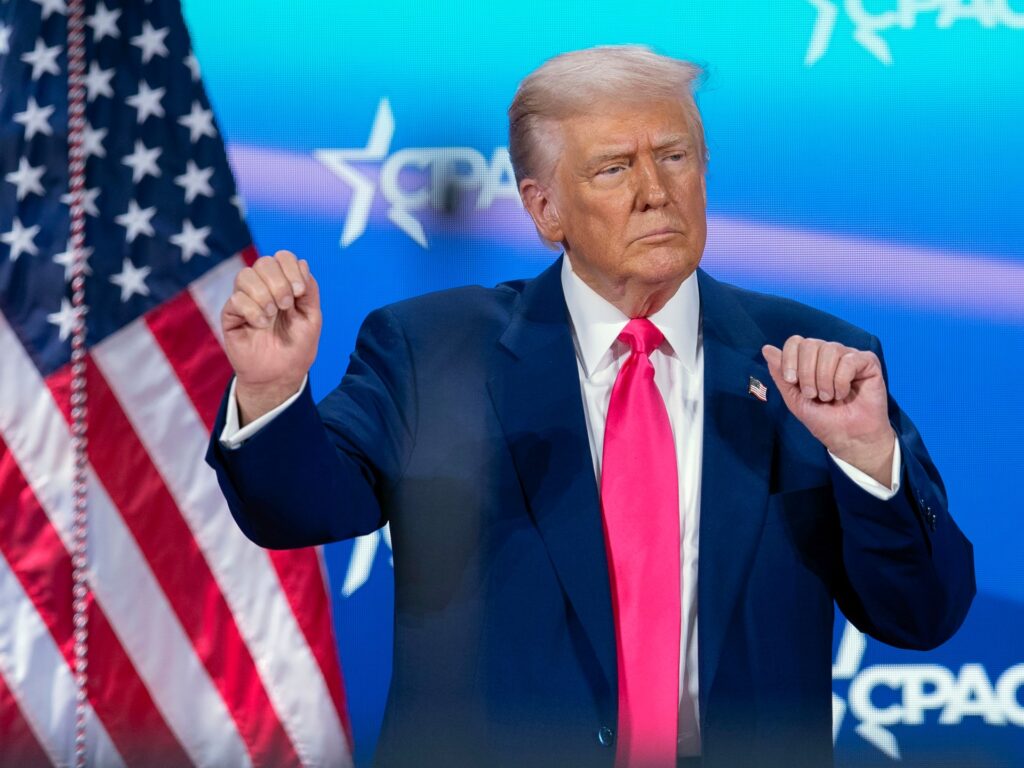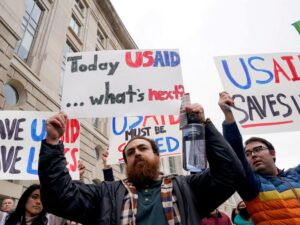
Tariffs on imports, mass firings of federal workers are some of the issues taking a toll on consumer psyche.
United States consumer confidence deteriorated at its sharpest pace in 3-1/2 years in February while 12-month inflation expectations surged, offering further signs that Americans were growing anxious about the potential negative impact on the economy of President Donald Trump’s policies.
The Conference Board survey on Tuesday noted that “comments on the current administration and its policies dominated the responses”.
It followed on the heels of surveys last week showing steep declines in business and consumer sentiment in February. Tariffs on imports, which Trump has already imposed or is planning to, have been singled out as the major issue in almost every survey of households and businesses.
Economists said unprecedented layoffs of federal government workers were also taking a toll on consumers’ psyche, which they said posed a risk to spending, the main engine of the economy.
“Americans are increasingly pessimistic about the outlook. No Federal government has ever before threatened government workers with mass firings and it is starting to scare the daylights out of consumers,” said Christopher Rupkey, chief economist at FWDBONDS. “The economy could well ground to a halt in the first quarter of the year as consumers stay home.”
Advertisement
The Conference Board’s consumer confidence index dropped 7 points, the biggest decline since August 2021, to 98.3 this month. Economists polled by Reuters had forecast the index falling, but only to 102.5. The third straight monthly decrease pushed the index to the lowest level since June 2024. It is now at the bottom of the range that has prevailed since 2022.
“There was a sharp increase in the mentions of trade and tariffs, back to a level unseen since 2019,” said Stephanie Guichard, senior economist for global indicators at the Conference Board. “Most notably, comments on the current administration and its policies dominated the responses.”
Business and consumer sentiment soared following Trump’s November 5 victory on hopes for a less-stringent regulatory environment, tax cuts and low inflation. Trump, a Republican, has during his first month in office slapped an additional 10 percent tariff on Chinese imports. A 25 percent levy on imports from Mexico and Canada was suspended until March. Trump this month raised tariffs on steel and aluminium imports to 25 percent.
Mass firings
Tariffs on automobiles, semiconductors and pharmaceutical imports are looming. At the same time, tens of thousands of federal government workers, mostly those on probation, have been fired by billionaire Elon Musk’s Department of Government Efficiency, or DOGE – an entity created by Trump.
US stocks fell on the confidence data. The dollar eased against a basket of currencies. US Treasury yields slipped.
Advertisement
Though economists are not yet predicting a recession, they expect a long period of very slow economic growth and high inflation. That would put the Federal Reserve in a difficult spot. The US central bank paused cutting interest rates in January while policymakers monitored the economic impact of the Trump administration’s policies.
The Fed has reduced its benchmark overnight interest rate by 100 basis points since September, when it embarked on its policy easing cycle. It hiked the policy rate by 5.25 percentage points in 2022 and 2023 to tame inflation.
Consumers’ average 12-month inflation expectations jumped to 6 percent, the highest since May 2023, from 5.2 percent in February.
The survey’s so-called labour market differential, derived from data on respondents’ views on whether jobs are plentiful or hard to get, declined to 17.1 from 19.4 last month.
This measure correlates to the unemployment rate in the US Department of Labor’s monthly employment report.











More Stories
Apple shareholders vote against pressure to scrap diversity policies
US judge issues deadline for Trump administration to pay foreign aid funds
Russia reaffirms opposition to European troops in Ukraine